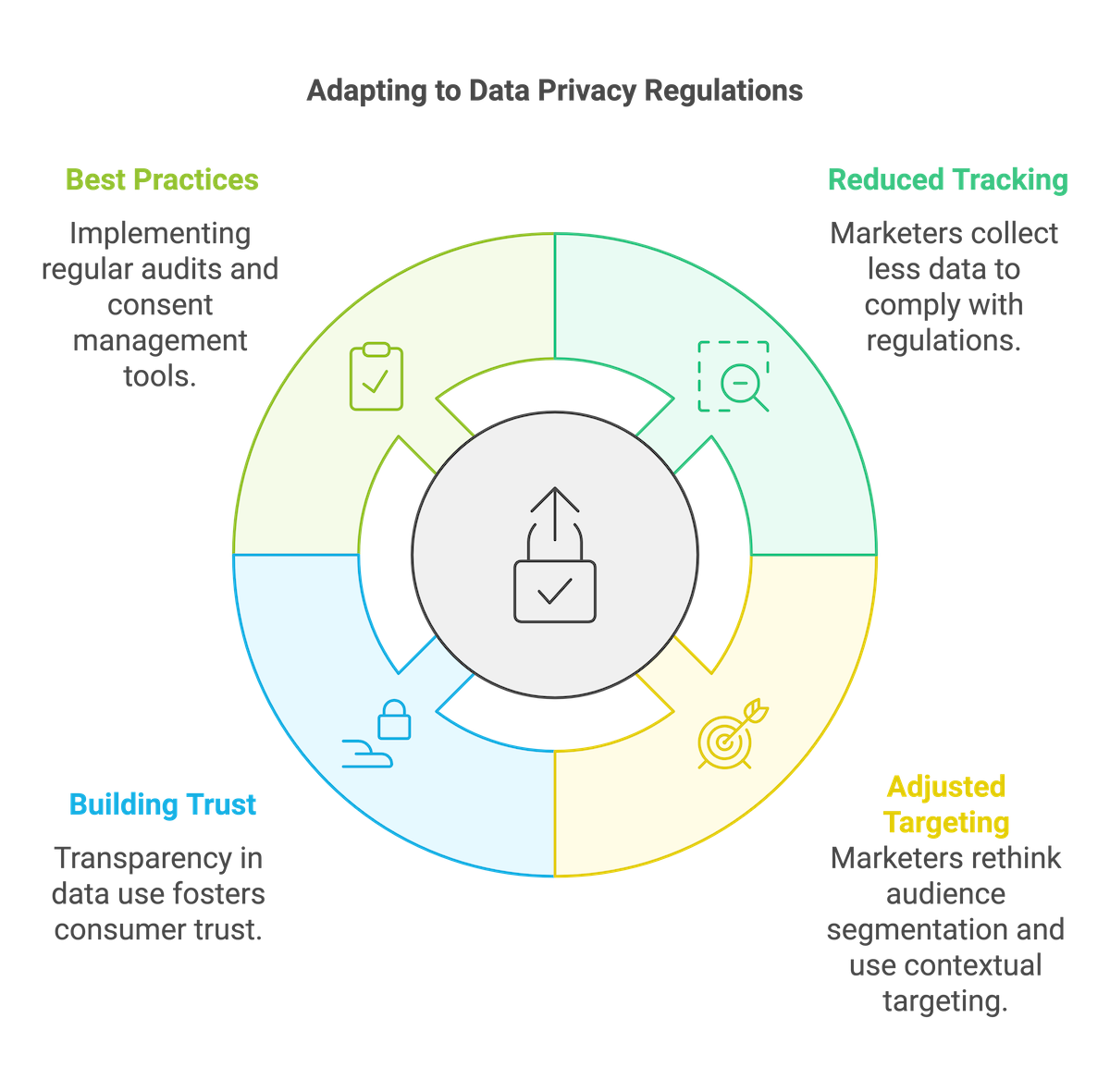Data Privacy Regulations: What Marketers Need to Know (w/ "Are You Privacy-Compliant?" Quiz!)
By: Hayden Jarman

Marketers are no strangers to change.
But few shifts are as massive as the ones brought by data privacy regulations.
These laws impact everything from how you collect data to how you target your audience. They’re not just hoops to jump through—they’re non-negotiable rules that can make or break your campaigns.
Here’s what you need to know to stay ahead while building trust with your audience.
Table of Contents:
- What Are Data Privacy Regulations?
- How Privacy Laws Are Changing Marketing
- Best Practices for Privacy-Compliant Marketing
- Data Privacy Compliance Checklist
- The Role of Consumer Trust in Marketing
- How to Adapt to Privacy Regulations
- FAQs About Data Privacy in Marketing
- How Privacy Regulations Improve Marketing
- Final Thoughts
🛡️ Are You Privacy-Compliant? Quiz 🔍
Evaluate your knowledge of privacy compliance and get personalized recommendations!
What Are Data Privacy Regulations?
Data privacy regulations are laws that dictate how businesses handle personal data. They ensure transparency, give consumers control, and penalize misuse.
Whether you’re tracking website behavior, collecting emails, or analyzing customer preferences, these rules shape how you operate.
Key Regulations Marketers Must Know
| Regulation | Jurisdiction | Key Features |
|---|---|---|
| GDPR | European Union | Consent-driven, transparency-focused |
| CCPA/CPRA | California, USA | Opt-out for data sales, deletion rights |
| LGPD | Brazil | Consent and security |
| VCDPA | Virginia, USA | Sensitive data control |
| DMA | European Union | Fair competition in digital markets |
Each of these laws requires businesses to handle personal data responsibly. Failure to comply can lead to fines of up to $21 million or 4% of global turnover in some cases.
How Privacy Laws Are Changing Marketing
Privacy regulations are reshaping the way marketers collect and use data. The old playbook of unrestricted tracking and mass targeting is gone.
Reduced Tracking
Marketers have scaled back their tracking efforts. 39% of U.S. marketers report collecting less customer data to meet compliance requirements.
Instead of relying on third-party cookies, marketers are shifting toward first-party data.
Adjusted Targeting
32% of marketers are now rethinking how they segment their audiences. Contextual targeting, which matches ads to the content users engage with, is gaining traction.
This approach respects privacy while keeping campaigns effective.
Building Trust Through Transparency
Consumers want to know what you’re collecting and why. A 2023 survey found that 84% of U.S. consumers are more likely to share data if they understand its purpose.
Transparency isn’t just a legal necessity. It’s a trust-builder.
Best Practices for Privacy-Compliant Marketing
Marketers who embrace privacy rules don’t just avoid fines—they gain a competitive edge.
Conduct Regular Data Audits
Audit your data collection methods regularly. Identify what data you’re collecting, why you need it, and how it’s stored.
Keep only the essentials to reduce risks and simplify compliance.
Use Consent Management Tools
Tools like Usercentrics make compliance easier.
These tools help you:
- Add consent banners to your site.
- Give users clear opt-in and opt-out choices.
- Store consent records for audits.
Limit Data Collection
Collect only what you need. For example, if you’re running a contest, ask for an email address instead of unnecessary personal details like a phone number.
Invest in Data Security
Encrypt sensitive data. Use secure servers to protect against breaches. Data security isn’t optional—it’s expected.
Train Your Team
Your team needs to know the rules. Regular training ensures compliance across campaigns.
Data Privacy Compliance Checklist
- Add clear consent banners to your website.
- Update privacy policies and make them accessible.
- Encrypt all personal data.
- Offer opt-out options for non-essential data collection.
- Regularly review your processes to ensure compliance.
The Role of Consumer Trust in Marketing
Consumers are more protective of their data than ever. They’re aware of tracking mechanisms, and they expect transparency.
Data Sharing Preferences
A 2023 report showed that consumers are more willing to share information when they trust a brand. They’re looking for companies that value their privacy.
Marketers who prioritize trust gain a loyal audience.
Learn More: Explore our content marketing strategy guide to align your approach with consumer expectations.
How to Adapt to Privacy Regulations
Adapting to privacy rules requires a shift in strategy. It’s not about collecting less data—it’s about collecting the right data in the right way.
Build Relationships with First-Party Data
First-party data is gold. Use tools like surveys, quizzes, and email opt-ins to collect insights directly from your audience.
Create Value Through Transparency
Show consumers how sharing data benefits them. Highlight features like personalized recommendations or exclusive offers.
Rethink Targeting Strategies
Move away from invasive tracking. Focus on contextual targeting that aligns with consumer behavior.
FAQs About Data Privacy in Marketing
What’s the difference between GDPR and CCPA?
- GDPR applies globally to EU data, requiring explicit consent. CCPA focuses on U.S. consumers, giving them opt-out rights.
Are small businesses required to comply?
- Yes. While the scope may vary, even small businesses must follow these rules. Tools like BlueTone Media’s integrated marketing solutions can simplify compliance.
Does email marketing still work under privacy laws?
- Absolutely. Use double opt-ins to ensure compliance and build a quality email list.
How Privacy Regulations Improve Marketing
Privacy laws force marketers to focus on quality over quantity. Instead of casting a wide net, you’re building deeper connections with your audience.
Learn More: Discover how local SEO strategies can complement a privacy-first approach.
By adapting your strategies, you’re not just following the rules—you’re future-proofing your marketing efforts.

Final Thoughts
Data privacy isn’t just a regulation—it’s a way to build trust and create meaningful connections.
By following the rules, you’re showing your audience that you value their information as much as they do.
Stay ahead of the curve. Focus on transparency. And remember, great marketing starts with respecting your audience.
For more tips on privacy-compliant strategies, check out our blog on marketing insights.
Related Posts:
- Understanding Google’s Local Pack: How to Get Featured
- Google Business Profile FAQs: Everything You Need to Know
- The Best Google Ads Extensions to Boost Your Click-Through Rates
- How to Leverage Facebook Groups for Local Business Leads
- How to Use AI to Write Better Social Media Captions
- How to Optimize Google Reviews to Attract More Customers
- LinkedIn for B2B Marketing Success
- How to Conduct a Social Media Audit (w/ "Audit Readiness" Quiz!)
- Creating a Content Calendar for Consistent Posting
- The Importance of Mobile Optimization in 2024
- Data Privacy Regulations: What Marketers Need to Know
- The Role of Chatbots in Enhancing Customer Service
- SEO for Small Business: The Ultimate Guide to Getting Found Online
- The Role of Keyword Clustering in Modern SEO

